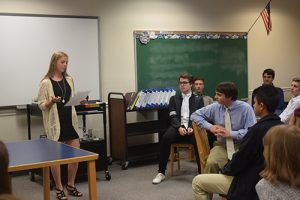
BERLIN — Stephen Decatur High School students were recognized last Friday for successfully completing the latest round of the EverFi Financial Literacy program.
The program is in its fourth year at the school and is sponsored by the Bank of Ocean City. EverFi underscores the need for young adults entering the 21st Century economy to truly understand what goes into their personal finances.
“I know a lot of people who just want to sign a piece of paper and they don’t understand insurance or home equity and now I feel like I know what all that means.” said Decatur senior Erin Smith.
EverFi offers students “The Sims” style online program that simulates all the big financial choices a person could make in their life. Topics range from getting their first checking and savings accounts to purchasing a car and a house, while covering resume preparation and the potential pitfalls of credit. Eventually, students find themselves virtually walking onto the floor of the New York Stock Exchange to learn about investing.
“It’s a different experience than a teacher just pointing out things on a Power Point or a whiteboard. Students love it and it’s much easier to learn something when it’s interesting,” said Bank of Ocean City Vice President Earl Conley. “I wish we had this class when I was in high school.”
Students are free to work at their own pace, as the simulator is offered entirely online and gives the information a depth and realism that can be lost in finance’s ledger lines and percentage points.
“It was interesting to see how saving a little over a long time pays off versus saving a lot over a short period of time,” said student Cole Mumford. “Everyone needs to know this stuff.”
Fellow class mate Wade Wilkins also thought the program was very beneficial.
“It’s something I learned a lot from,” Wilkins said, “Knowing what each number on a check was, how to fill out tax forms, the difference between scholarships and grants. It’s definitely something I’ll actually use in my life.”
Bank of Ocean City is proactive in educating the community about financial matters.
“The state requires that financial literacy be taught in schools now, and we saw that they haven’t come up with a way to fit it in the curriculum yet,” Conley said. “Instead of the school having to fund it and come up with a program, we thought we would step in and we would contribute.”
